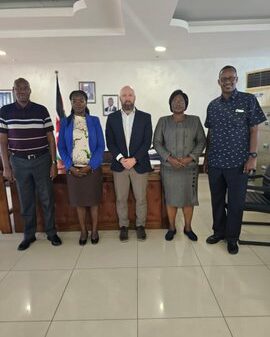NAIROBI, Kenya, Jan 27 – One fateful Monday morning in October 2010 is a day that Meshak, Vincent, Hathanas and Gilgrest, four brothers aged 15, 13, 11 and seven years respectively will never forget.
It is the day their mother died leaving them orphaned. That day snatched away the love of a mother, their sole provider and also took away their childhood.
“She got sick on Friday… Monday she went to hospital and by 1pm she died. She walked to hospital,” remembers 13-year-old Vincent Oloo who is the second born in the family.
She was HIV positive.
For more than a year now, the boys have been living alone in a one-roomed house in Korogocho slums. The house is accessed from an alley full of sewer waste that brings with it a torturous stench.
By day the house doubles as a sitting room and kitchen but at night it becomes a bedroom.
On this day, we find them boiling beans which will be their evening meal. Meshak, the first born in the family and who has taken the responsibility of a parent explains how they have shared responsibilities.
“One person will wash the utensils, another will go for water and another will cook,” he says.
The only person spared from the household chores is their seven-year-old sibling Gilgrest Ochieng.
Although they are still children, circumstances have made them become ‘adults.’ They now worry about many things like where their next meal will come from and how they will pay the house rent.
“Yesterday we slept hungry,” Meshak says.
“Charcoal has become expensive and sometimes we go to school without breakfast.”
His brother Vincent adds: “There is no food and the landlord also wants the Sh700 monthly house rent. He is threatening to close the house if we don’t pay.”
Although sometimes they receive food aid from the Kenya Network of Women living with Aids, KENWA, they say there are times the stock at KENWA runs out.
“Our neighbour here sometimes gives us food. She asks us whether we have something to eat and if we say no she gives us money to buy food and charcoal,” says 11-year-old Hathanas.
Meshak attends Undugu informal school while the others go to St John’s school in Korogocho. They are assisted by Catholic priests in their schooling.
In another home we find 19-year-old Kevin Ochieng. He is the eldest in a family of six.
They too are orphaned. Their mother died in July 2010. Their only memory of her is a poem they have dedicated to her that hangs on the wall of their one-roomed house.
“Our life has changed and become harder because we have to feed ourselves,” he explains.
They now depend on well wishers for food and the church for their education.
“My fees is paid by a priest, my two sisters are paid for by Catholic nuns and are in boarding school and the others are at St John’s – also paid for by nuns.
Government statistics indicate that there are an estimated 100,000 child-headed homes across the country.
According to psychologists, when children take up parenting roles at such an early age, they lose their childhood and it becomes overwhelming on them.
“When such a child heads a home, you find that they no longer go about their normal day to day activities that are expected of them as children. So you find that they tend to mature very fast and there is a gap in their development and that gap will definitely be felt later on in life,” explains Mercy Ringa Wanjagi, a psychologist.
Another psychologist Winnie Mwihaki says the effects can be classified into different areas that make up the life of an individual like emotional, mental, social and spiritual.
“Every single area is going to be affected for sure in a different way for different children because they have come from a very different peculiar circumstance and they are a different and peculiar person so depending on my coping mechanisms, your coping mechanisms, something may affect me and not affect you even with the kids that may be the case,” she says.
Both psychologists agree that the children require intensive counselling to cope with the situation.
“They will require grief and loss counselling, they require to be helped to cope with the loss of their parents. The fact that they have now taken up new responsibility as heads of homes, it’s overwhelming for them,” explains Wanjagi.
“Counselling helps anybody to manage a situation positive or negative and for them for sure they are in a situation which they need to be helped to manage. The parents have died, they have no clue what to do, when to do it and how to do it and that psychological support would be needed for that child,” Mwihaki adds.
Despite being Orphans and Vulnerable Children (OVCs), these two child-headed families do not benefit from the cash transfer programme, an initiative started by the government in 2004 to assist such children financially.
“It is not a universal programme, it is not supporting all OVC; we are doing specific targets at specific places so there are children who ought to be supported by this programme but are not being supported,” acknowledges Ahmed Hussein, Director of Children Services.
The programme has an annual budget of Sh3.3 billion. Currently 130,000 families across the country are receiving Sh2,000 from the programme every month. From this 1,300 families are child headed.
“The challenges we are facing is the number of children who are getting into the cycle that can be paid by this programme are getting more by the day. The budgetary allocation is not growing at the rate at which the needy families are growing and therefore we don’t have sufficient funds to run the programme in terms of expansion,” Hussein says.



































